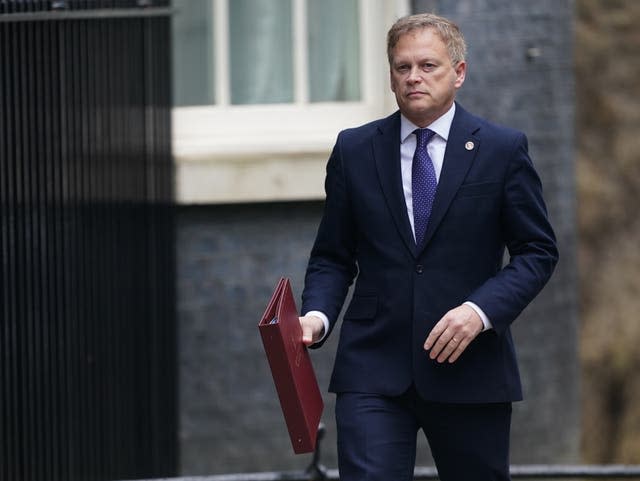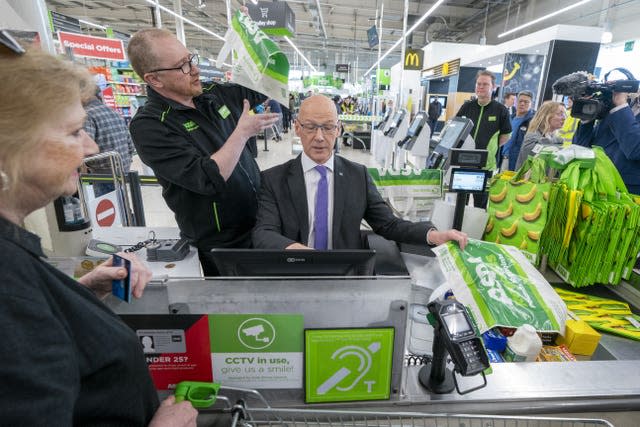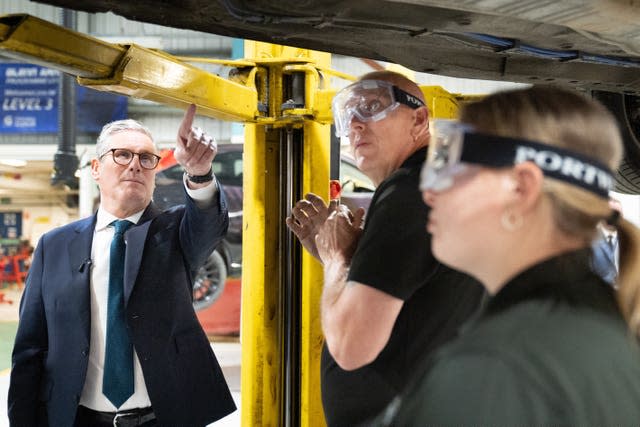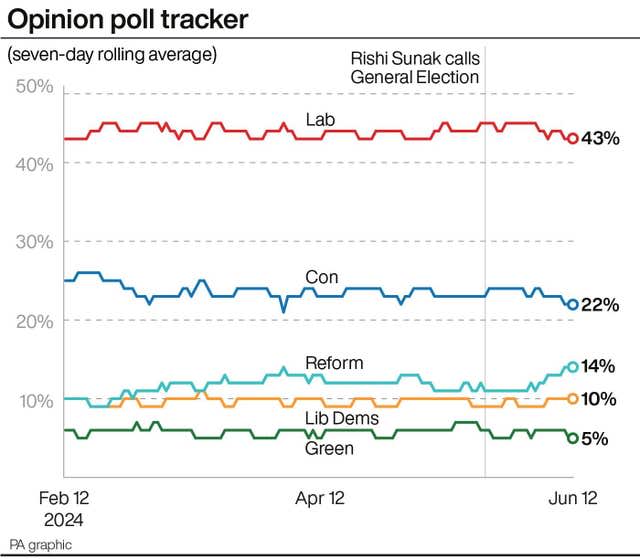Election campaign day 21: The Tories press the panic button
Defence Secretary Grant Shapps has warned Labour could be on course for a “supermajority” as he urged voters not to hand Sir Keir Starmer a “blank cheque” along with the keys to No 10.
Here are the key moments from day 21 of the General Election campaign:
– DO panic, Mr Mainwaring
After three weeks of relentlessly bad polls, it appears that someone in the Tory high command has decided that the moment has come to hit the panic button.
The Defence Secretary was in full reverse-Corporal Jones mode when he appeared on Times Radio, warning it would be “very bad news” for the country if Labour was returned with the sort landslide Tony Blair enjoyed in 1997.

“It’s perfectly legitimate to say the country doesn’t function well when you get majorities the size of Blair’s or even bigger,” he said, acknowledging Labour not only appeared to be on course to win, but to win big.
His appearance coincided with a doom-laden attack ad claiming voting for Reform UK or the Liberal Democrats on July 4 could give Labour 100 extra seats, casting the Conservatives into the wilderness with just 57 MPs.
Coming just the day after he launched his party’s election manifesto at Silverstone race track, Rishi Sunak denied he was throwing in the towel and conceding defeat.
“I’m really energised to now have a chance to put a very clear plan to the country and talk about all the things I want to do,” he insisted.
The Prime Minister, who is well known for his sweet tooth, admitted, however, that he is consuming “an enormous amount of sugar” to keep going, explaining that was why he was always so “pumped” on the campaign trail.
– Quote of the day
– Scottish independence still on the agenda, says Swinney
Scottish independence has not featured much so far in the election campaign, but SNP leader John Swinney insisted that did not mean his party has given up on the issue.
Campaigning in Edinburgh, the First Minister said he believed there should be another referendum within the next five years, telling reporters “that would be the best thing to happen”.

He said his aim in the campaign has been to relate independence to the practical concerns of Scottish voters.
“What I’ve done so far in this election campaign is essentially connect the concerns of members of the public to independence so that independence is not viewed as an abstract concept, but as a relevant concept,” he said.
– Picture of the day

– Raining on Rishi’s parade
The Prime Minister must be wondering what exactly he has done to offend the weather gods.
After his rain-sodden announcement last month on the steps of No 10 that he was calling an election, it appeared the elements have once again conspired to put the dampers on his prospects.

This time it was the latest figures from the Office for National Statistics which showed the economy flatlining in April, with the unusually wet weather blamed for consumers staying at home.
It was another bucket of cold water poured onto Tory hopes that an early interest rate cut could yet revive their campaign.
Nicholas Hyett, investment manager at Wealth Club, said: “The market had low expectations for the UK economy in April, and it duly delivered.”
– Hard luck stories
Mr Sunak’s disclosure that when he was growing up his family did not have Sky TV has prompted other leaders to reminisce about their childhoods.
The Prime Minister – the son of a GP and a pharmacist – hurriedly acknowledged he had had a “very, very fortunate” upbringing after the suggestion he had somehow been disadvantaged drew derision.
Sir Keir, meanwhile, revealed he “certainly didn’t have Sky TV” growing up, although given he was born in 1962 – 22 years before it was launched – this was perhaps unsurprising.

The Labour leader said his family had, however, “had to do without the phone on a number of occasions because we couldn’t pay the bill”.
He added: “I put a football through one of our windows and we couldn’t afford to mend it for a while so we had to just put some boarding over it.”
Green Party co-leader Carla Denyer also went without Sky TV while her parents had second-hand cars, in what she acknowledged was a “fairly comfortable childhood” but “certainly not a luxurious one”.
The sympathy vote, however, went to her co-leader Adrian Ramsay who said: “I went without a pet for a large amount of my childhood but eventually persuaded my family otherwise.”
– Social media moment
Mr Sunak’s disclosure that he went without Sky TV as a child was a top trend on X, formerly Twitter, with many social media users poking fun at the prime minister’s attempt at relatability.
Comedy writer Michael Spicer posted a video with the caption “rishi sunak having a fever dream”, showing him playing a sleeping prime minister mumbling “oh but father, if we subscribe to the movie bundle package, they’ll give us a six month bonus period” before waking up with a gasp.
Comedian Rosie Holt got confessional, posting “everyone, I’m finally ready to tell my story. I also didn’t have Sky TV growing up”.
rishi sunak having a fever dream pic.twitter.com/zL0nbmiDwy
— Michael Spicer (@MrMichaelSpicer) June 12, 2024
Everyone, I’m finally ready to tell my story. I also didn’t have Sky TV growing up.
— Rosie Holt (@RosieisaHolt) June 12, 2024
– What the polls are saying
Four nationwide opinion polls have been published in the past 24 hours, all still showing Labour well ahead of the Conservatives.

Savanta gives Labour a lead of 19 percentage points over the Tories, Survation and Focaldata both put Labour 18 points ahead, while YouGov has them enjoying a 20-point advantage.
An average of all polls that were carried out wholly or partly during the seven days to June 12 puts Labour on 43%, 21 points ahead of the Conservatives on 22%, followed by Reform on 14%, the Lib Dems on 10% and the Greens on 5%.
Reform’s average is up two percentage points on the figure for the previous week while Labour and the Tories are down one point.
– What’s happening tomorrow
Labour launches its General Election manifesto in Manchester.
The Prime Minister takes a break from the campaign trail to join the G7 leaders’ summit in Italy.


